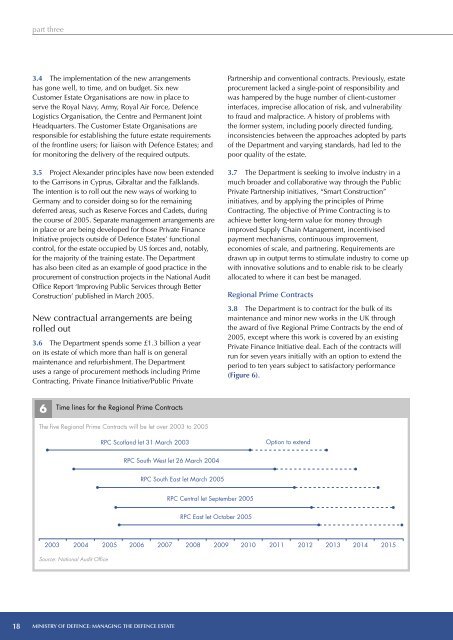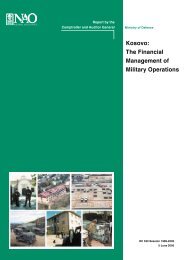part three3.4 The implementation of the new arrangementshas gone well, to time, and on budget. Six newCustomer Estate Organisations are now in place toserve the Royal Navy, Army, Royal Air Force, DefenceLogistics Organisation, the Centre and Permanent JointHeadquarters. The Customer Estate Organisations areresponsible for establishing the future estate requirementsof the frontline users; for liaison with Defence Estates; andfor monitoring the delivery of the required outputs.3.5 Project Alexander principles have now been extendedto the Garrisons in Cyprus, Gibraltar and the Falklands.The intention is to roll out the new ways of working toGermany and to consider doing so for the remainingdeferred areas, such as Reserve Forces and Cadets, duringthe course of 2005. Separate management arrangements arein place or are being developed for those Private FinanceInitiative projects outside of Defence Estates’ functionalcontrol, for the estate occupied by US forces and, notably,for the majority of the training estate. The Departmenthas also been cited as an example of good practice in theprocurement of construction projects in the <strong>National</strong> <strong>Audit</strong><strong>Office</strong> <strong>Report</strong> ‘Improving Public Services through BetterConstruction’ published in March 2005.New contractual arrangements are beingrolled out3.6 The Department spends some £1.3 billion a yearon its estate of which more than half is on generalmaintenance and refurbishment. The Departmentuses a range of procurement methods including PrimeContracting, Private Finance Initiative/Public PrivatePartnership and conventional contracts. Previously, estateprocurement lacked a single-point of responsibility andwas hampered by the huge number of client-customerinterfaces, imprecise allocation of risk, and vulnerabilityto fraud and malpractice. A history of problems withthe former system, including poorly directed funding,inconsistencies between the approaches adopted by partsof the Department and varying standards, had led to thepoor quality of the estate.3.7 The Department is seeking to involve industry in amuch broader and collaborative way through the PublicPrivate Partnership initiatives, “Smart Construction”initiatives, and by applying the principles of PrimeContracting. The objective of Prime Contracting is toachieve better long-term value for money throughimproved Supply Chain Management, incentivisedpayment mechanisms, continuous improvement,economies of scale, and partnering. Requirements aredrawn up in output terms to stimulate industry to come upwith innovative solutions and to enable risk to be clearlyallocated to where it can best be managed.Regional Prime Contracts3.8 The Department is to contract for the bulk of itsmaintenance and minor new works in the UK throughthe award of five Regional Prime Contracts by the end of2005, except where this work is covered by an existingPrivate Finance Initiative deal. Each of the contracts willrun for seven years initially with an option to extend theperiod to ten years subject to satisfactory performance(Figure 6).6Time lines for the Regional Prime ContractsThe five Regional Prime Contracts will be let over 2003 to 2005RPC Scotland let 31 March 2003Option to extendRPC South West let 26 March 2004RPC South East let March 2005RPC Central let September 2005RPC East let October 20052003 20042005 2006 2007 2008 2009 2010 2011 2012 2013 2014 2015Source: <strong>National</strong> <strong>Audit</strong> <strong>Office</strong>18MINISTRY OF DEFENCE: MANAGING THE DEFENCE ESTATE
part three3.9 Appointed prime contractors will have overall singlepoint responsibility for the management and deliveryof a project, or provision of an integrated estate serviceincluding some new assets (those up to a pre-agreed valueand type) and maintenance of the existing infrastructure.The prime contractor will also co-ordinate and integratethe activities of his pre-appointed supply chain to meet theservice delivery specification, efficiently, economically,innovatively and on time, with a recognition of the militaryand other needs of the Department. The Regional PrimeContract Scotland, for example, will provide for capitalworks and property maintenance services respectivelyat 17 Establishments, covering 174 secondary sites witha total of 9,250 buildings or facilities. This contract alsohas, exceptionally, a large construction project on theClyde costing over £100 million to provide 1,700 singleliving accommodation units together with associatedinfrastructure, catering and recreational facilities.3.10 Defence Estates aspires to deliver 30 per centthrough-life value for money efficiencies, in terms ofquality improvements, for the same or less resource inputthrough the five Regional Prime Contracts by 2009-10.Defence Estates has an interim target of 3 per cent in2005-06 and will be measuring progress through its valuefor money model.Project Aquatrine3.11 Project Aquatrine will transfer the responsibilityfor the maintenance and operation of the Department’ssewage works, water processing plants and water mains,sewers and drains that are outside buildings, removalof surface water and water supply for fire fighting usein order to place the responsibility of managing thoserisks with those best placed to do so. The Project will bedelivered through three separate contracts which are beingnegotiated separately (Figure 7).Single Living Accommodation Modernisation Project3.12 At the Defence Estate Conference, on the14 March 2001, the Secretary of State for Defenceannounced an additional £1 billion of new funding overthe next 10 years for raising the standard of single livingaccommodation. This requirement is being delivered inpart by the Single Living Accommodation ModernisationProject, or Project SLAM. It was expected that this projectalone would deliver around 10,000 bed-spaces in the firstfive year phase with a similar number in the second fiveyear phase.3.13 The prime contract is based on an initial five-yearprogramme of work in Great Britain (Phase 1), followingwhich the Department has an option to extend by afurther five years, subject to the satisfactory performanceof the contractor, and the achievement of cost and timerequirements. The aim is to upgrade, progressively, by 2013,the worst Single Living Accommodation to the physicalcondition deemed appropriate to provide Servicemenand women with the quality of living accommodationthey deserve. In 2001, over three-quarters of single livingaccommodation was below the required standard. Indeed,four per cent was so poor that personnel were only chargedfor utilities. The contract was awarded on 18 December2002 to DEBUT services, a Birmingham based consortiumled by Bovis Lend Lease and Babcock Support Services.As at 31 December 2004, 1,189 bed spaces had beencompleted; 3,910 were under construction and another2,376 in design and development.7Project AquatrineAquatrine will be let in three packages as part of onecoherent package.Package AOn 20 May 2003, the Department announced that Yorkshirebasedconsortium BREY Utilities, comprising Yorkshire Water,Earth Tech Engineering Ltd and KBR (Kellogg Brown & Root)had been awarded the first Project Aquatrine contract for‘Package A’ (covering the Midlands, Wales and South WestEngland). The contract went live on 1 December 2003.Package BPackage B (Scotland), the second of three contracts wasawarded to Thames Water Nevis Ltd, a wholly ownedsubsidiary of Thames Water whose major partner will beScottish Water. The contract was signed in September 2004and will commence services in March 2005.Package COn 11 November 2003, the Department announced thatthe C2C Consortium comprising Severn Trent Water Servicesplc and Costain Engineering and Construction Ltd, had beenawarded the Preferred Bidder status for Package C (North andEast of England), the third Contract to be awarded. The contractwas signed in October 2004 with the package go-live dueMarch 2005.Source: Ministry of DefenceMINISTRY OF DEFENCE: MANAGING THE DEFENCE ESTATE19
















